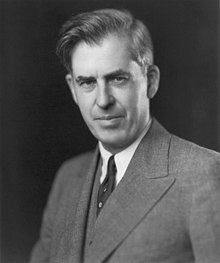Henry A. Wallace
| Henry A. Wallace | |
|---|---|
 |
|
| 33rd Vice President of the United States | |
|
In office January 20, 1941 – January 20, 1945 |
|
| President | Franklin D. Roosevelt |
| Preceded by | John Nance Garner |
| Succeeded by | Harry S. Truman |
| 10th United States Secretary of Commerce | |
|
In office March 2, 1945 – September 20, 1946 |
|
| President |
Franklin D. Roosevelt Harry S. Truman |
| Preceded by | Jesse Holman Jones |
| Succeeded by | W. Averell Harriman |
| 11th United States Secretary of Agriculture | |
|
In office March 4, 1933 – September 4, 1940 |
|
| President | Franklin D. Roosevelt |
| Preceded by | Arthur M. Hyde |
| Succeeded by | Claude R. Wickard |
| Personal details | |
| Born |
Henry Agard Wallace October 7, 1888 Orient, Iowa, U.S. |
| Died | November 18, 1965 (aged 77) Danbury, Connecticut, U.S. |
| Nationality | American |
| Political party |
|
| Spouse(s) | Ilo Browne |
| Children |
|
| Alma mater | Iowa State University |
| Religion | Episcopalian |
| Signature | |
Henry Agard Wallace (October 7, 1888 – November 18, 1965) was the 33rd Vice President of the United States (1941–1945), the Secretary of Agriculture (1933–1940), and the Secretary of Commerce (1945–1946). Wallace was a strong supporter of New Deal liberalism, and softer policies towards the Soviet Union. His public feuds with other officials and unpopularity with party bosses in major cities caused significant controversy during his time as Vice President under Franklin Delano Roosevelt in the midst of World War II, and resulted in Democrats dropping him from the ticket in the 1944 election in favor of Senator Harry S Truman. In the 1948 presidential election, Wallace left the Democratic Party to run unsuccessfully as the nominee of the Progressive Party against Truman, Republican Thomas E. Dewey, and States' Rights Democrat Strom Thurmond. He won 2.4% of the popular vote and no electoral votes, and finished fourth.
The Wallace family was of Scots-Irish Presbyterian heritage and had originally emigrated from Ulster to Pennsylvania. Henry Agard Wallace's grandfather, Henry Wallace or "Uncle Henry", was a former Presbyterian minister who preached the social gospel. As a large landowner in Iowa, Uncle Henry was an advocate of scientific farming and helped organize The Farmers' Protective Association, the Agricultural Editors Association, and the Iowa Improved Stock Association, becoming the editor of the Iowa Homestead, the state's largest and most important farm publication. He viewed it as his life mission to serve God by helping his fellow farmers.
...
Wikipedia
